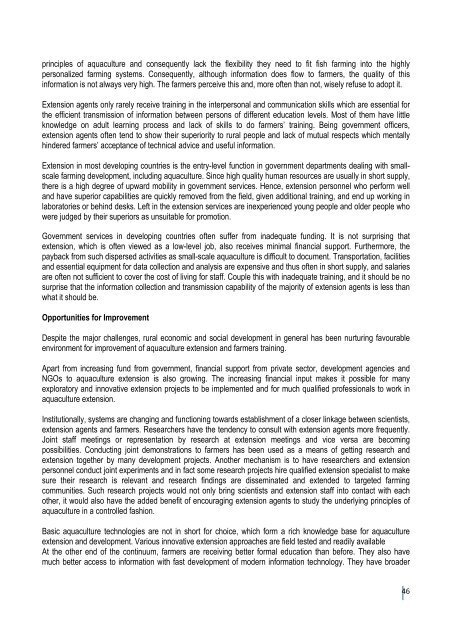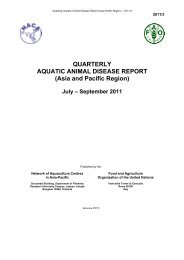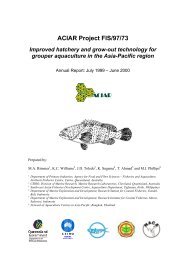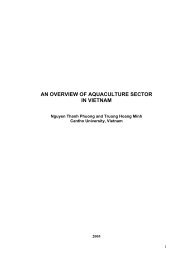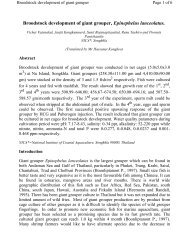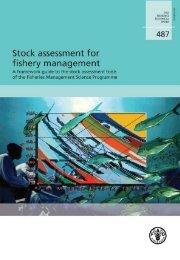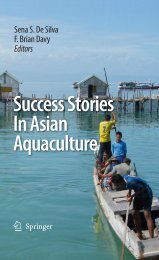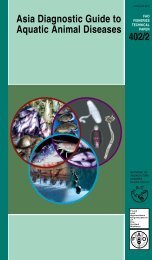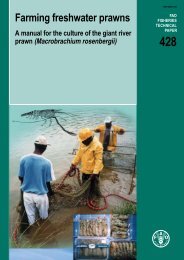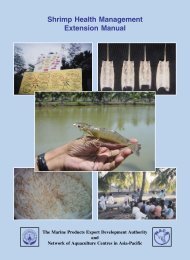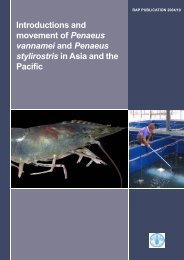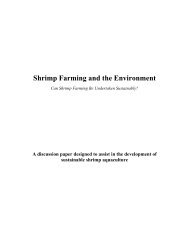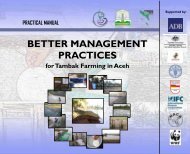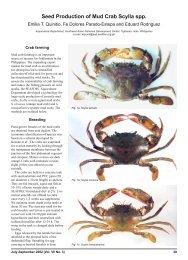Training of Trainers - Library - Network of Aquaculture Centres in ...
Training of Trainers - Library - Network of Aquaculture Centres in ...
Training of Trainers - Library - Network of Aquaculture Centres in ...
- No tags were found...
Create successful ePaper yourself
Turn your PDF publications into a flip-book with our unique Google optimized e-Paper software.
pr<strong>in</strong>ciples <strong>of</strong> aquaculture and consequently lack the flexibility they need to fit fish farm<strong>in</strong>g <strong>in</strong>to the highlypersonalized farm<strong>in</strong>g systems. Consequently, although <strong>in</strong>formation does flow to farmers, the quality <strong>of</strong> this<strong>in</strong>formation is not always very high. The farmers perceive this and, more <strong>of</strong>ten than not, wisely refuse to adopt it.Extension agents only rarely receive tra<strong>in</strong><strong>in</strong>g <strong>in</strong> the <strong>in</strong>terpersonal and communication skills which are essential forthe efficient transmission <strong>of</strong> <strong>in</strong>formation between persons <strong>of</strong> different education levels. Most <strong>of</strong> them have littleknowledge on adult learn<strong>in</strong>g process and lack <strong>of</strong> skills to do farmers’ tra<strong>in</strong><strong>in</strong>g. Be<strong>in</strong>g government <strong>of</strong>ficers,extension agents <strong>of</strong>ten tend to show their superiority to rural people and lack <strong>of</strong> mutual respects which mentallyh<strong>in</strong>dered farmers’ acceptance <strong>of</strong> technical advice and useful <strong>in</strong>formation.Extension <strong>in</strong> most develop<strong>in</strong>g countries is the entry-level function <strong>in</strong> government departments deal<strong>in</strong>g with smallscalefarm<strong>in</strong>g development, <strong>in</strong>clud<strong>in</strong>g aquaculture. S<strong>in</strong>ce high quality human resources are usually <strong>in</strong> short supply,there is a high degree <strong>of</strong> upward mobility <strong>in</strong> government services. Hence, extension personnel who perform welland have superior capabilities are quickly removed from the field, given additional tra<strong>in</strong><strong>in</strong>g, and end up work<strong>in</strong>g <strong>in</strong>laboratories or beh<strong>in</strong>d desks. Left <strong>in</strong> the extension services are <strong>in</strong>experienced young people and older people whowere judged by their superiors as unsuitable for promotion.Government services <strong>in</strong> develop<strong>in</strong>g countries <strong>of</strong>ten suffer from <strong>in</strong>adequate fund<strong>in</strong>g. It is not surpris<strong>in</strong>g thatextension, which is <strong>of</strong>ten viewed as a low-level job, also receives m<strong>in</strong>imal f<strong>in</strong>ancial support. Furthermore, thepayback from such dispersed activities as small-scale aquaculture is difficult to document. Transportation, facilitiesand essential equipment for data collection and analysis are expensive and thus <strong>of</strong>ten <strong>in</strong> short supply, and salariesare <strong>of</strong>ten not sufficient to cover the cost <strong>of</strong> liv<strong>in</strong>g for staff. Couple this with <strong>in</strong>adequate tra<strong>in</strong><strong>in</strong>g, and it should be nosurprise that the <strong>in</strong>formation collection and transmission capability <strong>of</strong> the majority <strong>of</strong> extension agents is less thanwhat it should be.Opportunities for ImprovementDespite the major challenges, rural economic and social development <strong>in</strong> general has been nurtur<strong>in</strong>g favourableenvironment for improvement <strong>of</strong> aquaculture extension and farmers tra<strong>in</strong><strong>in</strong>g.Apart from <strong>in</strong>creas<strong>in</strong>g fund from government, f<strong>in</strong>ancial support from private sector, development agencies andNGOs to aquaculture extension is also grow<strong>in</strong>g. The <strong>in</strong>creas<strong>in</strong>g f<strong>in</strong>ancial <strong>in</strong>put makes it possible for manyexploratory and <strong>in</strong>novative extension projects to be implemented and for much qualified pr<strong>of</strong>essionals to work <strong>in</strong>aquaculture extension.Institutionally, systems are chang<strong>in</strong>g and function<strong>in</strong>g towards establishment <strong>of</strong> a closer l<strong>in</strong>kage between scientists,extension agents and farmers. Researchers have the tendency to consult with extension agents more frequently.Jo<strong>in</strong>t staff meet<strong>in</strong>gs or representation by research at extension meet<strong>in</strong>gs and vice versa are becom<strong>in</strong>gpossibilities. Conduct<strong>in</strong>g jo<strong>in</strong>t demonstrations to farmers has been used as a means <strong>of</strong> gett<strong>in</strong>g research andextension together by many development projects. Another mechanism is to have researchers and extensionpersonnel conduct jo<strong>in</strong>t experiments and <strong>in</strong> fact some research projects hire qualified extension specialist to makesure their research is relevant and research f<strong>in</strong>d<strong>in</strong>gs are dissem<strong>in</strong>ated and extended to targeted farm<strong>in</strong>gcommunities. Such research projects would not only br<strong>in</strong>g scientists and extension staff <strong>in</strong>to contact with eachother, it would also have the added benefit <strong>of</strong> encourag<strong>in</strong>g extension agents to study the underly<strong>in</strong>g pr<strong>in</strong>ciples <strong>of</strong>aquaculture <strong>in</strong> a controlled fashion.Basic aquaculture technologies are not <strong>in</strong> short for choice, which form a rich knowledge base for aquacultureextension and development. Various <strong>in</strong>novative extension approaches are field tested and readily availableAt the other end <strong>of</strong> the cont<strong>in</strong>uum, farmers are receiv<strong>in</strong>g better formal education than before. They also havemuch better access to <strong>in</strong>formation with fast development <strong>of</strong> modern <strong>in</strong>formation technology. They have broader46


